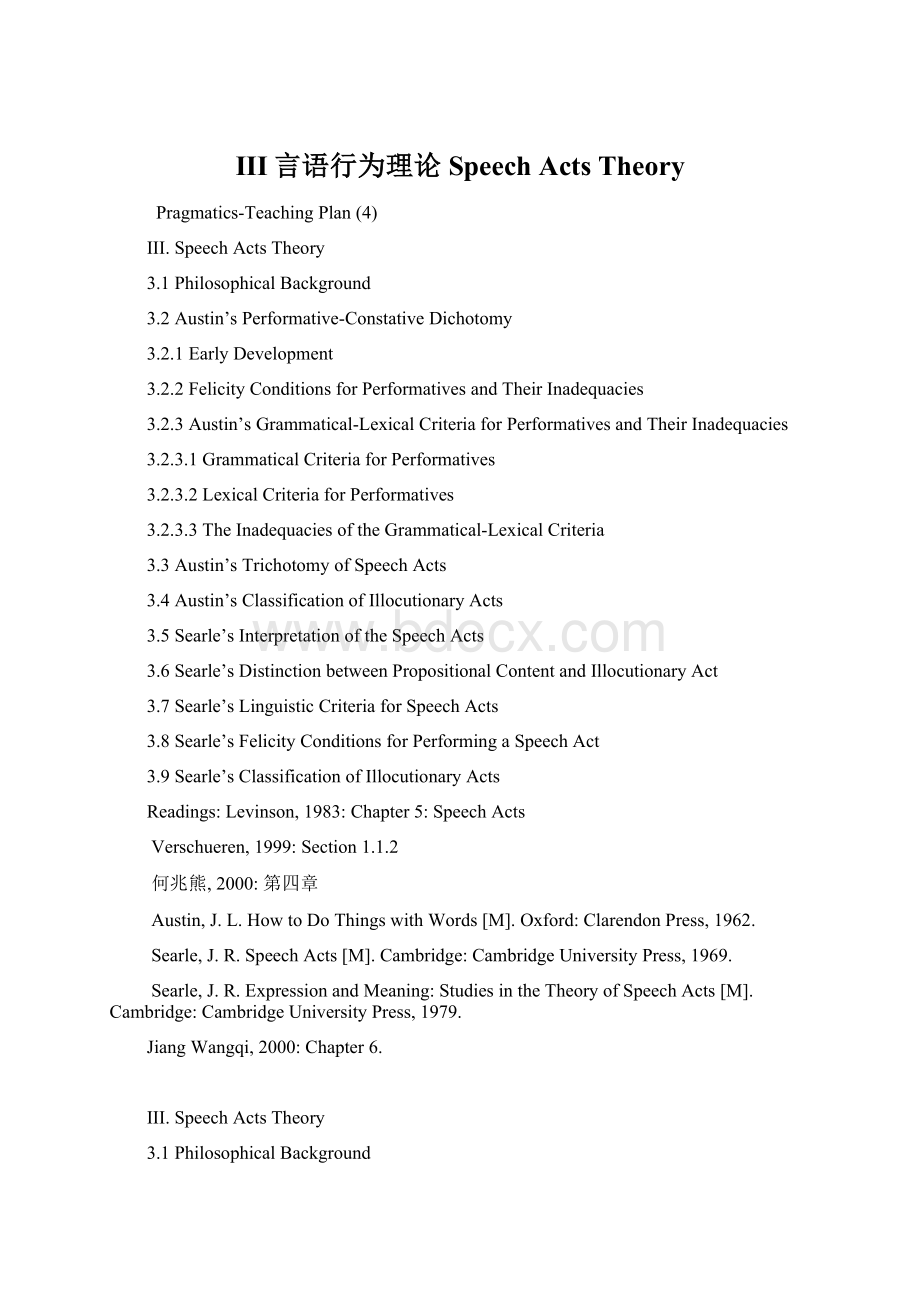III言语行为理论Speech Acts Theory.docx
《III言语行为理论Speech Acts Theory.docx》由会员分享,可在线阅读,更多相关《III言语行为理论Speech Acts Theory.docx(17页珍藏版)》请在冰豆网上搜索。

III言语行为理论SpeechActsTheory
Pragmatics-TeachingPlan(4)
III.SpeechActsTheory
3.1PhilosophicalBackground
3.2Austin’sPerformative-ConstativeDichotomy
3.2.1EarlyDevelopment
3.2.2FelicityConditionsforPerformativesandTheirInadequacies
3.2.3Austin’sGrammatical-LexicalCriteriaforPerformativesandTheirInadequacies
3.2.3.1GrammaticalCriteriaforPerformatives
3.2.3.2LexicalCriteriaforPerformatives
3.2.3.3TheInadequaciesoftheGrammatical-LexicalCriteria
3.3Austin’sTrichotomyofSpeechActs
3.4Austin’sClassificationofIllocutionaryActs
3.5Searle’sInterpretationoftheSpeechActs
3.6Searle’sDistinctionbetweenPropositionalContentandIllocutionaryAct
3.7Searle’sLinguisticCriteriaforSpeechActs
3.8Searle’sFelicityConditionsforPerformingaSpeechAct
3.9Searle’sClassificationofIllocutionaryActs
Readings:
Levinson,1983:
Chapter5:
SpeechActs
Verschueren,1999:
Section1.1.2
何兆熊,2000:
第四章
Austin,J.L.HowtoDoThingswithWords[M].Oxford:
ClarendonPress,1962.
Searle,J.R.SpeechActs[M].Cambridge:
CambridgeUniversityPress,1969.
Searle,J.R.ExpressionandMeaning:
StudiesintheTheoryofSpeechActs[M].Cambridge:
CambridgeUniversityPress,1979.
JiangWangqi,2000:
Chapter6.
III.SpeechActsTheory
3.1PhilosophicalBackground
Speechacttheoryisthefirstmajortheoryinpragmatics,initiallyproposedinthe1950sandwidelydiscussedinthe1960sand1970s.Thereisanenormousliteratureonitfromboththephilosophicalandlinguisticpointofview.(JiangWangqi,p197)
Intheearly20thcentury,philosophersrealizedthatmanyphilosophicalproblemswereinfactproblemsoflanguage,andcouldbesolvedthroughaproperanalysisoflanguage.Thisapproachtophilosophycametobeknownasanalyticphilosophyorlinguisticphilosophy,ofwhichlogicalpositivism(orlogicalempiricism逻辑实证哲学)andordinarylanguagephilosophyweretwocontrastiveschools.JohnLangshawAustin,thefatherofthespeechacttheory,wastherepresentativeoftheordinarylanguagephilosophers.
Logicalpositivismandordinarylanguagephilosophydisagreeinanumberofways:
(1)Intheirattitudestowardsordinarylanguage:
Logicalpositivism:
Ordinarylanguageisinadequateandneedstobepolishedorreplacedbyanideal,logical,orartificiallanguage;
Ordinarylanguagephilosophy:
Ordinarylanguageisthebest,mostneededanddesirableone.
(2)Intheirtheoriesofmeaning:
Logicalpositivism:
Unlessasentencecanbeverifiedortestedforitstruthorfalsity,itismeaningless.Andlogicalpositivistshavedevelopedatheoryofmeaningonthebasisoftruthconditions.
Ordinarylanguagephilosophy:
Adistinctionshouldbemadebetweenasentenceandtheuseofthesentence.Asentenceinabstractsensecannotbeassignedanytruthvalue;onlywhenasentenceisusedinactualsituations,willitbepossibletosaywhetheritistrueornot.
SpeechacttheorygrowsoutofAustin’sstruggleagainstlogicalpositivism.Austin’sfirstshotatlogicalpositivismisthattherearetwotypesofsentences:
performativesentences,whichareusedtodothings,andconstativesentences,whichareusedtodescribethings.
(JiangWangqi,p197-198.TobemodifiedwithreferencetoLevinson,p227)
3.2Austin’sPerformative-ConstativeDichotomy
3.2.1EarlyDevelopment
Thisperformative-constativedistinctionwasfirstmadebyAustininthelate1930stointerpretthespeechactof“promising”.AccordingtoAustin,bysaying“Ipromise”,oneisnotjusttosaysomethingormakeanautobiographicalassertionaboutoneselflike“Iplaycricket”,buttodoit,thatis,tomakeapromise.Austindevotedmuchefforttothisstudyofthetypeofutteranceswhichlookautobiographical,asifthespeakerweresayingofhimselfthathedoessomething,whereasinfactheisdoingit.(JiangWangqi,p198-199).
In1952,Austinbegantogiveaseriesoflecturesentitled“WordsandDeeds”inOxford.In1955,whenhewenttotheUnitedStatestodeliverWilliamJameslectures,herevisedthelecturenotesandrenameditHowtoDoThingswithWords.ThebookofthesametitlewascompiledandpublishedbyhisstudentJ.O.Urmsonin1962.Itcontains12lectures,inthefirst7ofwhichAustindiscussedtheperformative-constativedichotomy.(JiangWangqi,p200).
Constativeutterances
Examples:
(1)Ipoursomeliquidintothetube.(saidbyachemistryteacherinademonstrationofanexperiment,whichdescribestheteacher’sactionatthetimeofspeaking)
Theutteranceofthissentenceisnottheperformanceoftheactionofpouringsomeliquid.Theteachercannotpouranyliquidintoatubebysimplyutteringthesewords.Hemustaccompanyhiswordswiththeactualpouringofsomeliquidintothetube.Otherwiseonecanaccusehimofmakingafalsestatement.
(2)WewentdowntoComo.(Thissentencecanbeevaluatedalongthedimensionoftruth/falsity,too)
Performativeutterances
Examples:
(1)Ido.(asutteredintheweddingceremony)
(2)InamethisshiptheQueenElizabeth.(asutteredforaship-launchingceremony)
(3)Igiveandbequeathmywatchtomybrother.(asoccurringinone’swill)
(4)Ibetyousixpenceitwillraintomorrow.(asutteredforbetting)
(Austin,1962:
5)
(5)Ipromisetofinishitintime.(asinpromise-makng)
(6)Iapologize.
(7)Ideclarethemeetingopen.
(8)Iwarnyouthatthebullwillcharge.
Thecommonfeaturesofperformativeutterancesareasfollows:
(A)Theydonot“describe”or“report”orconstateanythingatall,arenot“true”or“false”;
(B)Theutteringofthesentenceis,orisapartof,thedoingofanaction,whichagainwouldnotnormallybedescribedas,oras“just”,sayingsomething.
(Austin,1975[1962]:
5)
(C)Theycannotbesaidtobetrueorfalse,butcanbeevaluatedalongadimensionof“felicity”(恰当性).Forexample,“IpromisetogotoComo”isnotfelicitousunlessIintendtogotoComoandcommitmyselftodoingso;“InamethisshiptheQueenElizabeth”requiresmybeingauthorizedtoperformthenamingofthisship.
Anillustration:
Example
(2),saidbytheQueenofEnglandataship-launchingceremony,isnotadescriptionofwhatwasdoingatthetimeofspeaking;toutterthissentenceistoperformtheveryactionofnamingthisship;onecannotsaytheQueenmadeafalsestatement,eventhoughshedidnotaccompanyherwordswiththeactionofactuallywritingQueenElizabethontheship.
3.2.2FelicityConditionsforPerformativesandTheirInadequacies
Althoughperformativescannotbeevaluatedastrueorfalse,therearestillwaysinwhichtheywillgowrong,beunhappy/infelicitous.Inotherwords,thereareconditionstobemettoproduceanappropriateperformative.ThefollowingarethethreefelicityconditionssuggestedbyAustin(1962:
14-15)andrewrittenbyLevinson(1983:
229):
A.(i)Theremustexistanacceptedconventionalprocedurehavingacertainconventionaleffect,thatproceduretoincludetheutteringofcertainwordsbycertainpersonsincertaincircumstances.
Forillustration,inMuslincultures,amanmayachieveadivorcebysayingtohiswife“Iherebydivorceyou”threetimesinsuccession.Theutteringofthesewordsconstitutestheperformanceofdivorce.AsaBritishcitizen,however,hecannotdivorcehiswifeinthisway.ThereisnosuchaconventionalprocedureinBritishsociety.
A.(ii)Theparticularpersonsandcircumstancesinagivencasemustbeappropriate,asspecifiedinheprocedure.
Forillustration,accordingtotheMuslintradition,onlythemanhastherighttodivorcehiswifeinthewaymentionedabove,andhehastoaddressittohiswife;otherwise,thedivorceprocedurewillstillbeinfelicitous.
B.Theproceduremustbeexecutedbyallparticipants(i)correctlyand(ii)completely.
Forillustration,intheabovementioneddivorceceremony,theMuslinmanmustusethecorrectsentence.Ifhedoesnot,thenitwillnothavetheexpectedeffect.Andhemustsayitthreetimesinsuccession.Onceortwiceisnotenoughtobringitoff.
C.(i)Oftenthepersonsmusthavetherequisitethoughts,feelingsandintentions,asspecifiedintheprocedure.
Thatistosay,thespeakermustmeanwhathesays.Whenpromising,forexample,hemustbepreparedtofulfillit.
C.(ii)Ifconsequentconductisspecified,thentherelevantpartiesmustsodo.
Forexample,havingpromised,thespeakermustdosoaccordingly.
Problemsinthethreefelicityconditions:
Inthediscussionoftheseconditions,however,Austingraduallyrealizedthattheyarenotreallyusefulfordistinguishingperformativesfromconstatives.
Supportingarguments:
Itistruethatwithsomeperformatives,therewillbeaconventionalprocedureandtheproceduremustbeexecutedcorrectlyandcompletelyindeed.SoattheweddingceremonyinBritain,whenthepriestasksthebridegroom,“Wiltthouhavethiswomantothyweddedwife…and,forsakingallother,keeptheeonlyuntoher,solongasyebothshalllive?
”,thebridegroomcouldonlyanswer“Yes,Iwill”.Hecannotuseotherexpressions,eveniftheyaresynonymous.
Counter-arguments:
(1)Itisalsotruethatwithsomeperformatives,theremaynotbesuchastrictrestrictiononwording:
(A)Ataship-launchingceremony,thenamermayeitherusenameorchristen;
(B)Tomakeapromise,oneeithersayIpromiseorIgivemyword;
(2)Ontheotherhand,theso-calledconstativesmayalsobeinfelicitousinaboveways:
(A)TheconstativeThepresentkingofFranceisbaldisinfelicitousinthesamewaysastheperformativeIbequeathyoumyBenzsaidbysomeonewhodoesnothaveaBenz.Theybothpresupposetheexistenceofsomethingnonexistent.
(B)Thepersonwhomakesastatementmustalsohavetherequisitethoughts,fee